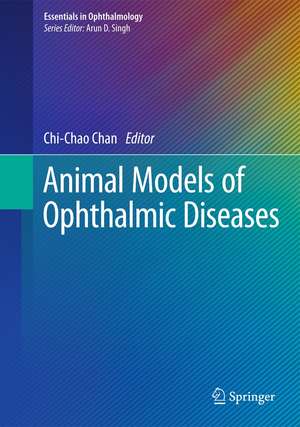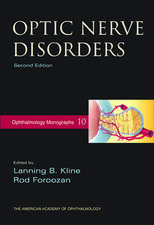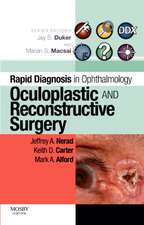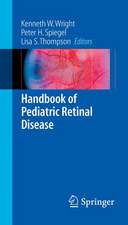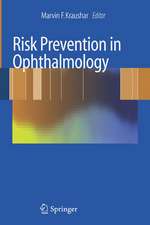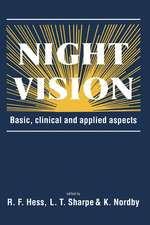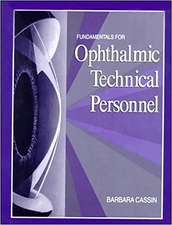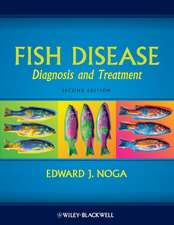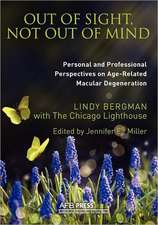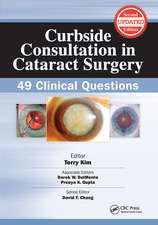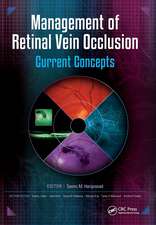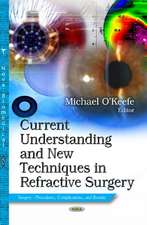Animal Models of Ophthalmic Diseases: Essentials in Ophthalmology
Editat de Chi-Chao Chanen Limba Engleză Hardback – 18 dec 2015
| Toate formatele și edițiile | Preț | Express |
|---|---|---|
| Paperback (1) | 711.15 lei 6-8 săpt. | |
| Springer International Publishing – 28 mar 2019 | 711.15 lei 6-8 săpt. | |
| Hardback (1) | 719.74 lei 6-8 săpt. | |
| Springer International Publishing – 18 dec 2015 | 719.74 lei 6-8 săpt. |
Din seria Essentials in Ophthalmology
- 5%
 Preț: 452.75 lei
Preț: 452.75 lei - 5%
 Preț: 550.16 lei
Preț: 550.16 lei - 5%
 Preț: 717.93 lei
Preț: 717.93 lei - 5%
 Preț: 202.57 lei
Preț: 202.57 lei - 5%
 Preț: 719.02 lei
Preț: 719.02 lei - 5%
 Preț: 719.38 lei
Preț: 719.38 lei - 5%
 Preț: 1164.31 lei
Preț: 1164.31 lei - 5%
 Preț: 724.14 lei
Preț: 724.14 lei - 5%
 Preț: 1111.26 lei
Preț: 1111.26 lei - 5%
 Preț: 715.00 lei
Preț: 715.00 lei - 5%
 Preț: 561.41 lei
Preț: 561.41 lei - 5%
 Preț: 1119.68 lei
Preț: 1119.68 lei - 5%
 Preț: 474.88 lei
Preț: 474.88 lei - 5%
 Preț: 1325.18 lei
Preț: 1325.18 lei - 5%
 Preț: 1106.13 lei
Preț: 1106.13 lei - 5%
 Preț: 651.54 lei
Preț: 651.54 lei - 5%
 Preț: 846.13 lei
Preț: 846.13 lei - 5%
 Preț: 366.35 lei
Preț: 366.35 lei - 5%
 Preț: 1433.10 lei
Preț: 1433.10 lei - 5%
 Preț: 751.20 lei
Preț: 751.20 lei - 5%
 Preț: 847.00 lei
Preț: 847.00 lei - 5%
 Preț: 782.10 lei
Preț: 782.10 lei - 5%
 Preț: 1292.32 lei
Preț: 1292.32 lei - 5%
 Preț: 720.02 lei
Preț: 720.02 lei - 5%
 Preț: 668.64 lei
Preț: 668.64 lei - 5%
 Preț: 1104.48 lei
Preț: 1104.48 lei - 5%
 Preț: 1341.85 lei
Preț: 1341.85 lei - 5%
 Preț: 973.86 lei
Preț: 973.86 lei - 5%
 Preț: 1096.62 lei
Preț: 1096.62 lei - 5%
 Preț: 1050.38 lei
Preț: 1050.38 lei - 5%
 Preț: 1411.15 lei
Preț: 1411.15 lei - 5%
 Preț: 1206.60 lei
Preț: 1206.60 lei - 5%
 Preț: 1256.01 lei
Preț: 1256.01 lei - 5%
 Preț: 371.83 lei
Preț: 371.83 lei - 5%
 Preț: 778.80 lei
Preț: 778.80 lei - 5%
 Preț: 1314.04 lei
Preț: 1314.04 lei
Preț: 719.74 lei
Preț vechi: 757.63 lei
-5% Nou
Puncte Express: 1080
Preț estimativ în valută:
137.72€ • 144.18$ • 113.96£
137.72€ • 144.18$ • 113.96£
Carte tipărită la comandă
Livrare economică 05-19 aprilie
Preluare comenzi: 021 569.72.76
Specificații
ISBN-13: 9783319194332
ISBN-10: 331919433X
Pagini: 150
Ilustrații: XV, 152 p. 13 illus. in color.
Dimensiuni: 178 x 254 x 11 mm
Greutate: 0.52 kg
Ediția:1st ed. 2016
Editura: Springer International Publishing
Colecția Springer
Seria Essentials in Ophthalmology
Locul publicării:Cham, Switzerland
ISBN-10: 331919433X
Pagini: 150
Ilustrații: XV, 152 p. 13 illus. in color.
Dimensiuni: 178 x 254 x 11 mm
Greutate: 0.52 kg
Ediția:1st ed. 2016
Editura: Springer International Publishing
Colecția Springer
Seria Essentials in Ophthalmology
Locul publicării:Cham, Switzerland
Public țintă
Professional/practitionerCuprins
1. Animal Models of Herpetic Keratitis; 2. ANIMAL MODELS OF CATARACTS; 3. Animal Models of Glaucoma; 4. Animal Models Age-Related Macular Degeneration; 5. Animal Models of Age-Related Macular Degeneration: Subretinal Inflammation; 6. Animal models of diabetic retinopathy; 7. Animal Models of autoimmune uveitis; 8. Animal Models of Retinitis Pigmentosa; 9. Animal Model of Graves' Orbitopathy 10. Animal models of ocular tumors; 11. Epilogue.
Notă biografică
Chi-Chao Chan, MD, graduated from the School of Medicine, Johns Hopkins University, Baltimore, Md., in 1975. She completed a residency in the Department of Ophthalmology, Stanford University School of Medicine and then became a Post-Doctoral Fellow at the Wilmer Ophthalmological Institute and a second Post-Doctoral Fellow at the National Eye Institute. Since 1992 she has been Chief of the Section on Immunopathology, Laboratory of Immunology, National Eye Institute, National Institutes of Health, Bethesda, Md., and in 1999 she was also appointed Chief of the Histology Core at the institute. Dr. Chan has received numerous awards, including an American Academy of Ophthalmology Senior Achievement Award in 2013 and in 2011 she was named an ARVO (Association for Research in Vision Ophthalmology) Gold Fellow. Since 1998 she has been the Honorary Director of the Eye Research Institute, Zhongshan Ophthalmic Center, Sun Yat-sen University, Guangzhou, China. Between 2007 and 2012 she was an Adjunct Professor in the Department of Ophthalmology & Visual Sciences, Chinese University of Hong Kong, and from 2008 to 2011, a Visiting Professor at Peking Union Medical College (PUMC), Beijing, China. Dr. Chan is an active member of many societies in the field of ophthalmology. She is an editorial board member for many journals, including the Journal of Ophthalmology, Journal of Ophthalmic Inflammation & Infection and the Journal of Clinical & Experimental Ophthalmology and from 2007 to 2014 was a Section Editor for the British Journal of Ophthalmology. She is the lead or co-author of more than 600 articles in peer-reviewed journals and co-author of Primary Intraocular Lymphoma (World Scientific Publishing Co., 2007).
Textul de pe ultima copertă
This book describes experimental animal models that mimic common human ocular diseases: herpetic keratitis, cataract, glaucoma, age-related macular degeneration, diabetic retinopathy, uveitis, retinitis pigmentosa, Graves’ disease, and intraocular tumors. In conjunction, these models reflect the diversity and utility of tools used to study human disease. World expert clinicians discuss each model based on their clinical experience, and the text is supported by numerous photos and diagrams.
Development of suitable experimental models is critical in identifying risk factors for disease, elucidating fundamental molecular mechanisms in disease progression, and providing guidance as to whether or not a particular treatment is safe and effective for humans. Like other forms of medical research, ophthalmology and vision research focuses on the investigation of disease pathogenesis and the discovery of novel therapies through in vitro and in vivo methodology. The in vivo experiments employ animal models including vertebrates (zebrafish, rodents, rabbits, and primates) and invertebrates (fruit flies and nematodes) for drug screening. In describing the most pertinent animal models of ophthalmic diseases, this book will be of interest to ophthalmologists, vision researchers, fellows, residents, and medical students.
Development of suitable experimental models is critical in identifying risk factors for disease, elucidating fundamental molecular mechanisms in disease progression, and providing guidance as to whether or not a particular treatment is safe and effective for humans. Like other forms of medical research, ophthalmology and vision research focuses on the investigation of disease pathogenesis and the discovery of novel therapies through in vitro and in vivo methodology. The in vivo experiments employ animal models including vertebrates (zebrafish, rodents, rabbits, and primates) and invertebrates (fruit flies and nematodes) for drug screening. In describing the most pertinent animal models of ophthalmic diseases, this book will be of interest to ophthalmologists, vision researchers, fellows, residents, and medical students.
Caracteristici
Describes the eye models highly relevant to common ocular diseases Written by international experts in the field Well illustrated with many photos and diagrams Includes supplementary material: sn.pub/extras
